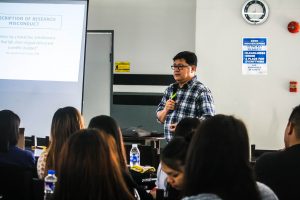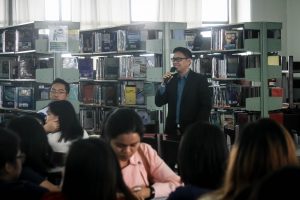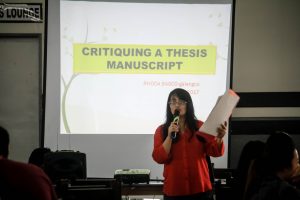The seminar on critiquing research output for teachers and students was conducted last April 22, 2017, from 8:00 am to 12:00nn at the Centennial Library of the University.
A total of 242 students attended the activity. They were from the School of Allied Medical Sciences, School of Criminal Justice and Public Safety, School of Business Administration and Accountancy, School of Dentistry, School of International Hospitality and Tourism Management, School of Engineering and Architecture, School of Teacher Education and Graduate School. Twenty-nine participants were research teachers, members of the research committees, research anchorpersons and support staff.
Dr. Janice Kaylyn Lonogan, faculty member of the School of Allied Medical Sciences and a member of the Institutional Ethic Research Committee welcomed the participants.
The Chairman of the Institutional Ethic Review Committee and a fac ulty member and subject head of Physical and Natural Sciences of the School of Allied Medical Sciences, Dr. Jun C. Corpuz, discussed some salient points on the topic of research misconduct. He discussed forms of research misconduct such as falsification, fabrication, plagiarism, piracy and types of scientific misconduct that every researcher should avoid.
ulty member and subject head of Physical and Natural Sciences of the School of Allied Medical Sciences, Dr. Jun C. Corpuz, discussed some salient points on the topic of research misconduct. He discussed forms of research misconduct such as falsification, fabrication, plagiarism, piracy and types of scientific misconduct that every researcher should avoid.
Engr. Victor V. Hafalla, a member of the Institutional Research Committee and faculty member of School of Engineering and Architecture gave a discussion about some common mistakes made by researchers in data analysis, interpreting results and presentation of results. He also gave pointers on how to present the table and graphs to reflect the results of the study. After the discussion, an open forum was conducted for some clarifications on statistical and table presentations.
School of Engineering and Architecture gave a discussion about some common mistakes made by researchers in data analysis, interpreting results and presentation of results. He also gave pointers on how to present the table and graphs to reflect the results of the study. After the discussion, an open forum was conducted for some clarifications on statistical and table presentations.
Dr. Rhoda Basco-Galangco, Director of Research Development Center, discussed the topics on critiquing a  thesis manuscript. She discussed how to evaluate the background of the study, population/locale, data gathering procedures, results and discussion, conclusions and recommendations and references. She also added the checking of attachments in the appendices like the signed communication letters, a sample of accomplished tools, informed consent forms, non-disclosure agreement, curriculum vitae of researcher/s, documents used and sample computations.
thesis manuscript. She discussed how to evaluate the background of the study, population/locale, data gathering procedures, results and discussion, conclusions and recommendations and references. She also added the checking of attachments in the appendices like the signed communication letters, a sample of accomplished tools, informed consent forms, non-disclosure agreement, curriculum vitae of researcher/s, documents used and sample computations.
Mr. Farland Valera, a faculty member of School of Liberal Arts and Human Sciences and a member of the Institutional Research Committee gave the closing remarks for the seminar.-NonaGabriel

